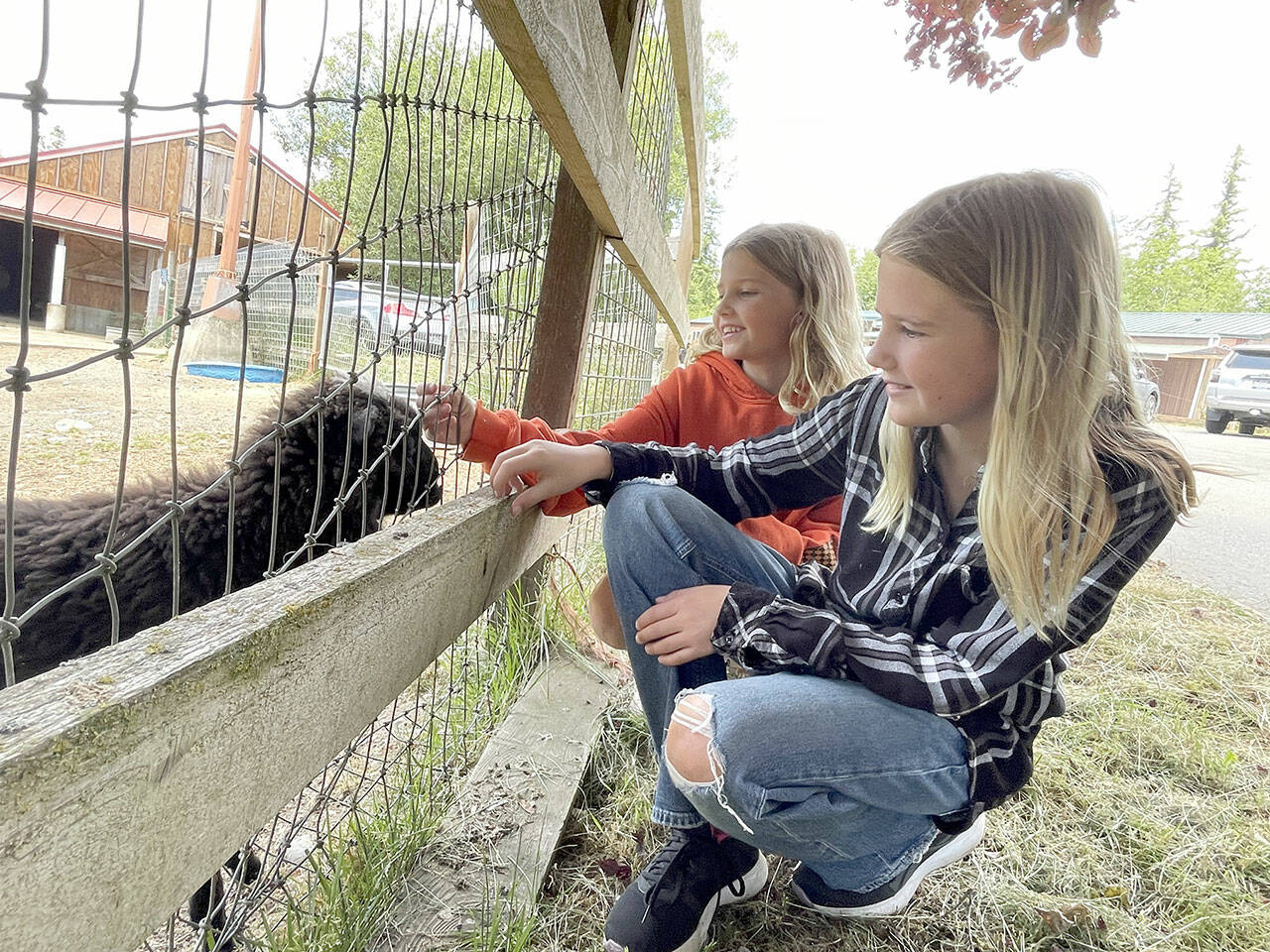QUILCENE — Dose the emu was found terrorizing campers at Dosewallips State Park. Joaquin the lamb was rejected by his mother and Miss Mae the raccoon was seized by the state Department of Fish and Wildlife from a couple who had illegally kept her as a pet. Geronimo the senior diabetic cat arrived as an underweight stray.
These four are among the hundreds of pets, livestock and wildlife that have made their way to Center Valley Animal Rescue over the past 21 years as victims of cruelty, neglect or hoarding, had owners who could no longer care for them or were found sick or injured.
Saturday’s open house at the nonprofit rescue’s 30-acre facility gave visitors an opportunity to meet many of its permanent and temporary residents, speak with the volunteers who care for them and learn about CVAR’s many services, from low-cost spay and neuter clinics to a pet food bank to adoptions to working with law enforcement to marine mammal rescue.
“It’s to bring in donations because we run off donations, and it’s also to get word out about Center Valley, do public outreach and recruit volunteers,” said director and founder Sara Penhallegon, who is a licensed veterinary technician and wildlife rehabilitator.
Kyle Stolp joined CVAR as its volunteer and fundraising coordinator seven months ago. He was familiar with CVAR from his previous job at WDFW, which frequently works with the organization in wildlife rescue.
“We have about 25 active volunteers and we could use more,” he said. “We need people to clean enclosures, spend time with the cats and dogs, help out in the office.”
Stolp said volunteers are required to attend orientation and four to five training sessions. They typically work one to three hours a week and can be as young as 8, depending on the animal they work with. (Volunteers are not allowed to work with wildlife.) Experience with animals or even a desire to work directly with them isn’t necessary.
“We have two projects, a large flight enclosure for rehabilitating wild birds and putting up a pre-fabricated barn to store hay we need help with,” he said. “Grant writing, we always need that. Or just working in the office.”
Laurie Brent began volunteering in January and spends most of her time in the reptile room, caring for its current residents: three iguanas, two ball pythons, a hognose snake and leopard geckos that are available for adoption.
“Iguanas are my passion,” said Brent, who lives in Kingston and works at the rescue two days a week.
Many owners relinquish iguanas because they are unprepared for caring for a pet that requires a large heat- and humidity-controlled environment and can live 10 to 25 years.
“They’re misunderstood and people are terrified of them because of their size,” Brent said.
CVAR focuses on rescue, rehabilitation and working with law enforcement in Clallam, Jefferson and Mason counties, although it is currently providing housing for animals in a Kitsap County case.
The rescue often becomes involved with law enforcement investigating livestock cruelty cases, such as receiving the seven starving bison seized from their owner in Chimacum in 2018. It is currently assisting on an investigation into the shooting of a band-tailed pigeon, which is a protected species.
When the need is there, CVAR will step in, Penhallegon said.
Over the past two months, for example, it held four spay/neuter clinics for 70 or so pigs that came from an animal cruelty case in Oregon and had been transferred to a rescue in Washington.
“They’re bringing them to us to spay because otherwise it’s 1,000 bucks a pig at a university to do it,” Penhallegon said. “They’re paying our cost, which was about $200 to $250 a pig. There’s no way we were keeping them. This was my way to give.”
The rescue relies on a corps of 10 volunteer veterinarians with expertise in domestic, avian, exotic and wildlife care.
“Some of them come once every six weeks, but some of them, every time I call, they answer and they’re great,” Penhallegon said.
The rescue recently received a grant of $12,000 from WDFW that will go toward purchasing new capture and safety equipment for staff, and veterinary medical equipment for animals.
“It’s paying for half of in-house laboratory equipment,” Penhallegon said. “When we have emergency cases right now, we have to send that lab work out and we don’t get results until the next day so we don’t know what we’re treating. The lab that we’ve been using stopped doing wildlife and exotic animals, so I have to package that up and ship it to California and I have like a three-day turnaround to get results.”
When installed, the new equipment, in concert with its existing veterinary surgery room, digital X-ray and ultrasound machines, will enhance and expand CVAR’s ability to diagnose, treat and care for animals.
Penhallegon is an optimist who said she focused on what she can do, not what might have happened to an animal in the past.
And there are plenty of happy endings at CVAR. The abused pets that are nursed back to health and adopted, the injured wildlife that are rehabilitated and released, and the emaciated and neglected livestock that are fed, cared for and readied for their next home.
Penhallegon kept the now 5-year-old bison born to one of the seven starving cows CVAR received from law enforcement in 2018 because, she said, “he thinks I’m his mom.”
“The rest of those bison are in Texas at a sanctuary and they’re doing great,” Penhallegon said.
For information about volunteering, donating or adopting an animal, go to centervalleyanimalrescue.org.
________
Reporter Paula Hunt can be reached at paula.hunt@soundpublishing.com.

